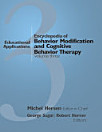Issues in Diagnostic Research
Michel Hersen · Cynthia G. Last
des. 2012 · Springer Science & Business Media
Rafbók
360
Síður
reportEinkunnir og umsagnir eru ekki staðfestar Nánar
Um þessa rafbók
Prior and subsequentto the publication of the third edition of the Diagnos tic and Statistical Manual of Mental Disorders (DSM-III), we have witnessed a considerable upsurge in the quantity and quality of research concerned with the psychiatric diagnostic process. There are several factors that have contributed to this empirical influx, including improved diagnostic cri teria for many psychiatric disorders, increased nosological attention to childhood psychopathology, and development and standardization of several structured diagnostic interview schedules for both adult and child populations. With the advent of DSM-III-R, and in anticipation of DSM-IV, diagnostic labels and their definitions have been in a state of change, as evinced by the many refinements and modifications currently taking place. However, the basic purpose or raison d'etre of the nosological scheme has not been altered. Psychiatric diagnosis is the means by which we classify or categorize human psychopathology. And, as is the case in the medical arena, psychiatric diagnosis serves three central functions: classification. communication. and prediction. As research accumulates, our understanding of psychiatric disorders increases, and we are in a much better position to classify reliably and with validity, as well as to com municate and predict Despite periodic changes in the diagnostic system, the basic strategies for conducting diagnostic research (e. g. , genetic-family studies, biological markers, follow-up studies, etc. ) do not vary appreciably over time. But in over one decade no scholarly book has appeared that tackles the essential research issues involved in upgrading the diagnostic endeavor.
Gefa þessari rafbók einkunn.
Segðu okkur hvað þér finnst.
Upplýsingar um lestur
Snjallsímar og spjaldtölvur
Settu upp forritið Google Play Books fyrir Android og iPad/iPhone. Það samstillist sjálfkrafa við reikninginn þinn og gerir þér kleift að lesa með eða án nettengingar hvar sem þú ert.
Fartölvur og tölvur
Hægt er að hlusta á hljóðbækur sem keyptar eru í Google Play í vafranum í tölvunni.
Lesbretti og önnur tæki
Til að lesa af lesbrettum eins og Kobo-lesbrettum þarftu að hlaða niður skrá og flytja hana yfir í tækið þitt. Fylgdu nákvæmum leiðbeiningum hjálparmiðstöðvar til að flytja skrár yfir í studd lesbretti.





